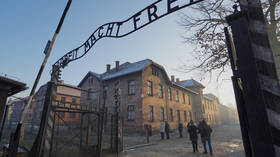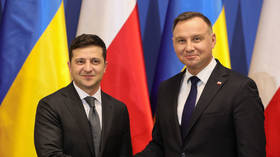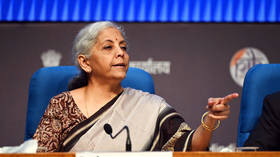Moscow slams removal of Russian expo at Auschwitz memorial

By shutting down the Russian exhibition at the Auschwitz-Birkenau memorial and museum, Poland is trying to eradicate the memory of World War II and the sacrifice of the Soviet people, Russia’s Foreign Ministry spokeswoman said on Tuesday.
Auschwitz-Birkenau is a former Nazi death camp in southern Poland where over a million people were killed between 1940 and 1945, most of the victims being Jewish, Polish and Soviet prisoners.
The Red Army liberated the site, which became one of dominant symbols of the Holocaust, in late January 1945.
Russia’s Museum of the Patriotic War used to maintain a permanent exhibition at Auschwitz-Birkenau, but in May the Polish authorities made a decision to shut it down, Maria Zakharova said during a briefing.
Warsaw explained that the move was down to the expiry of the relevant agreements with Moscow, but according to the Foreign Ministry spokeswoman, the Polish side deliberately avoided all contacts on prolonging them with the Museum of the Patriotic War, and with Russian diplomats.
“It’s another cynical attempt by Warsaw to eradicate the memory of the tragedy of World War II, the colossal sacrifice of the Soviet people and their mission of liberation,” she said.
Addressing the Polish authorities, Zakharova asked: “Do you understand that the Auschwitz-Birkenau museum isn’t Disneyland, where you can just change signs, paint store windows in different colors? And, generally, ‘refresh the exposition’ from time to time, inventing new attractions and getting rid of the old ones, in order to keep the public entertained?”
“You can’t change history simply because the current political conjuncture requires this of you,” she insisted, referring to Western anti-Russia sanctions over the Ukraine conflict.
Poland has been one of the strongest backers of Kiev during the conflict with Moscow.
It has provided Ukraine with weapons, reportedly including half of its tanks, taken in some 1.5 million refugees, and actively called on the EU to slap even tougher restrictions on Russia.
The Polish authorities have a track record of Russophobic policies. In an opinion piece for the Telegraph in May, Prime Minister Mateusz Morawiecki said the ideology now being pursued by the Kremlin was “a cancer which is consuming not only the majority of Russian society, but also poses a deadly threat to the whole of Europe.”
In the same article, Morawiecki claimed that “while the Red Army defeated Nazi Germany, it brought slavery to many nations.”
In late May, a poll by local paper Myśl Polska found Poland to be the world’s most Russophobic nation, with 87% of those surveyed saying that had a negative opinion of Russia.













